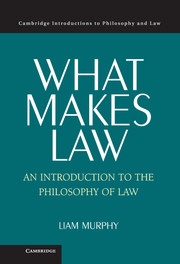3 - Legal Positivism
Published online by Cambridge University Press: 05 July 2014
Summary
A Normative System Grounded in Facts
To bring out what motivates positivism, it is best to think of it first in its purest and most plausible version, according to which moral reasoning is never required or appropriate in figuring out what the law is, even if legal sources can be interpreted as calling for it. Legal argument on this view is never, in any part, about what ought to be, never involves thinking about right and wrong, fairness or justice. Of course the language lawyers use overlaps with that used in moral discussion – in both domains we talk of rights, duties, obligations, wrongs, and so forth. But that is no embarrassment to the positivist, who can accept that the law typically and ideally reflects someone or some collective’s moral conclusions about what the law should be. Moreover, a statute or constitution or a history of decisions might give a great deal of guidance about what the specifically legal meaning some moral term, such as “justice,” may have acquired. What is important is that while the content of the law may have been, and ideally would have been, arrived at after moral deliberation, and while the law may use words also used in moral argument, moral deliberation is not required to identify law’s content after it has been made.
The law is what is posited, or put forward by a person or people. We may all hope that what gets posited is good, that it matches closely with what the law ought, morally speaking, to be. But, insists the positivist, it would be simply mad to look at what has been put forward as law by people and see there, instead, what ought to have been put forward. Suppose someone were to argue that slavery is illegal in a particular place in part because it is a violation of people’s moral rights. The positivist sees such an argument as like defending the claim that sexual promiscuity causes disease by saying that promiscuity deserves to be punished.
- Type
- Chapter
- Information
- What Makes LawAn Introduction to the Philosophy of Law, pp. 23 - 44Publisher: Cambridge University PressPrint publication year: 2014



